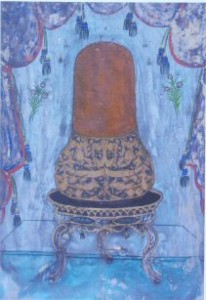Hazreti Sultan Veled’in Mirası
The Legacy of Hazret-e Sultan Valad
 Dr. Barihüda Tanrıkorur
Dr. Barihüda Tanrıkorur
Today with your kind permission I would like to discuss Hazrete Sultan Valad and his legacy. As you can see from the slide, from the topic which involves Hazreti Mevlânâ, the almost 700 year old Tariqat-i Mawlawiyya and its ensuing period, we will concentrate on only a small, but probably the most conspicuous and well known part of this legacy, the Mawlawi Sema Ritual Ceremony known as the Mawlawi Âyini Sharîf. However, because this topic is so vast we will only examine those sections where Hazrete Sultan Valad is commemorated.
After Husameddin Chalabi who had made the first attempts to organize an order, in 1292 when Sultan Veled Hazretleri became the spiritual leader, the sources say that he founded the Tarikat-i Mawlawiyya by incorporating his father, Hazreti Mevlânâ’s teachings and training methods. However the sources do not go into details about what Sultan Valad actually started or did when he founded the order, therefore it is very difficult for us to separate what he did from what was added or developped after him.
In 1312, after Sultan Valad, the Mevlevis were led by his son Ulu Ârif Chalabi. In this manner, the seed for a hierarchal transference of spiritual sovereignty, from father to son, or from older to younger, by the descendents of Hazreti Mawlânâ became established,. This tendency was completed by Ulu Ârif Chalabi, and from then on, Hazrete Mawlânâ Dergah became this sovereignty’s spiritual center and the sons of Molla Hunkâr (Hazreti Mawlana), the chalabis, each became its ruling sultan. After Sultan Valad, the tariqat was always headed by a descendant of Hazrete Mawlana, (the postnishins of Hazreti Mevlânâ Dergah), thus the Maqam Chalabi became the ultimate authority in the organization of the Mawlawi Order.
The Mawlawi Order, during its seven hundred year history, was in close contact with every section of society, from the palaces to the villages in the farthest corners of the empire, giving strict disciplined training, with education in religion, culture and the arts it functioned as an academy, a conservatory, producing great literary figures, poets, musicians and artisans. The Order, with its centralized government never decentralized into other branches, nourished by rich waqfs (foundations), the Maqam Chalabi developped into a sovereignty. Their tekkes, called mawlawihanas, distrbuted throughout the empire were governed from the home of the pîr or âsitana-i âliyya of Hazreti Mawlana Dergah in Konya, by postnishin–chalabi together with his board of ‘dede’ officers . Despite all of this, throughout its history, the order lived through some of its own internal problems. As a result of the heriditary claims to becoming Chalabi, acquiring a livelihood and the Chalabis getting involved in politics, , the samâ was banned and afterwards allowed to be performed on a few occasions and sometimes for long periods. The order became weakened as it lived through bloody incidents in the tekkes and other both positive and negative events. Over time, the tariqat became distanced from the people as it became popular among the palace and intellectuals. Finally in the end, as with other Ottoman institutions, as it became more and more corrupted the loss of spiritual meaning and character could not be avoided. For these reasons at the end of the 19th century, the order which had devitalized itself, was finally closed along with the other tariqats on the founding of the Turkish Republic.
We are curious as to how the Mawlawiyya tariqat saw its own founder? How did they commemorate him? Hoping to acquire some new insights, we decided to examine Hazrete Sultan Valad from this viewpoint. Besides the prayers called gulbank where his name was recited daily, the Mawlawis commemorated Hazrete Sultan Valad, in their most important group worship performed after the weekly Friday prayer, in the Devr-i Sultan Veledî section and lyrics of their Mawlawi Sama Ritual Ceremony called Mawlawi Âyîn-i Sharif.
Devamı yakında Nefes Yayınları tarafından yayınlanacak olan “Sırrın Sırrı Sultan Veled” kitabında yayınlanacaktır.

